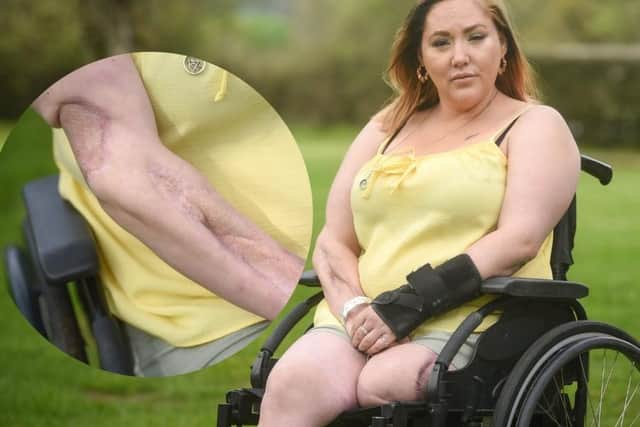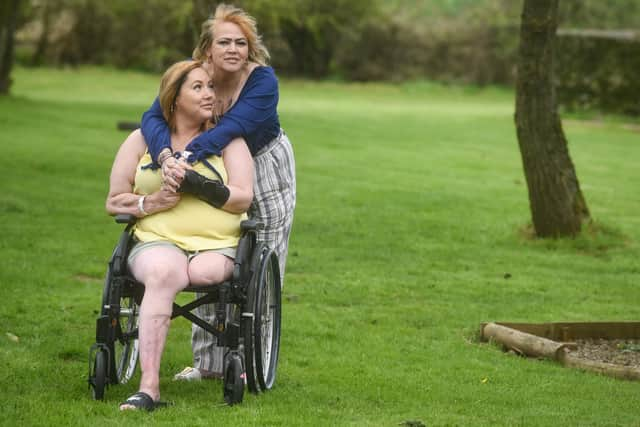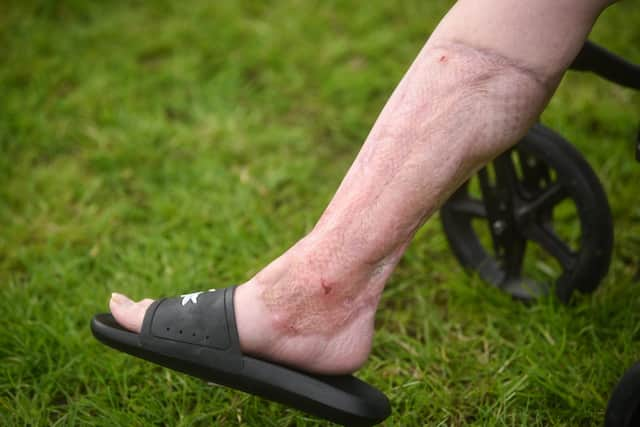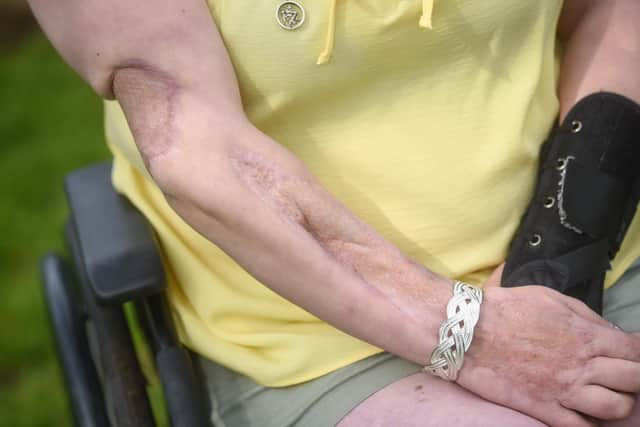Poulton woman left permanently disfigured after contracting extremely rare 'flesh-eating disease' necrotising fasciitis while in hospital
and live on Freeview channel 276
Emma Doherty caught the life-threatening infection while being treated for sepsis in February 2021.
The previously-fit cross country runner was given a less-than 1% chance of survival, and although she pulled through, Emma was left with multiple life-changing injuries.
Advertisement
Hide AdAdvertisement
Hide AdEmma told Blackpool Gazette: “It affected 85% of my body. The infection was moving through my body [so fast] the only way to stop it was to cut the [affected tissue] away.”


37-year-old Emma now gets around in a wheelchair after having a leg amputated. She had the tendons removed from her left wrist, and was left with severe nerve damage in the arm.
Extensive skin grafts mean the majority of her stomach covered in skin just 2mm thick, meaning Emma is constantly scared that even the slightest cut or injury could leave her internal organs exposed. But she feels lucky to be alive.
Mum put under ‘so much pressure’ to turn off the life support
While Emma was in a coma, in Medway Hospital, her mum was given daily updates from doctors – who stressed how serious her condition was.


Advertisement
Hide AdAdvertisement
Hide AdMum, Marie Keane, said: “I was shown pictures of her intestines and organs. On the third day it was like a sickly green film and i asked what it was and they said it was the infection creeping up, and if it hit her major organs there's nothing they could do. They put me under so much pressure to turn off the life support, but something in me kept telling me she’s still there, and there was no way I was letting her go.”
37 year old Emma was placed in an old people’s home
Emma moved from South East England, hoping for a ‘fresh start’ on the Fylde coast. She was promised rehab to help her to re-learn basic tasks – like talking, feeding herself and using the bathroom.
But since it happened during Covid, she told the Gazette that she didn’t get the support she needed.


Instead, social services placed her in a care home for elderly people, where she frequently saw residents who had died from Covid being taken away.
Advertisement
Hide AdAdvertisement
Hide AdWith no council houses available, she was found accommodation in a Blackpool B&B. Then on the day before she was due to move in they learnt it was unsuitable, as her wheelchair wouldn’t fit through the door.
A ‘complex case’
Emma now lives with her mum at Swans Rest Holiday Lodges and Cottages in Poulton.


She added: “I don’t feel any further on that I was a year and a half ago. All I ever get told is that I’m a very complex case. I’d think that would warrant a complex plan but unfortunately that doesn’t seem to happen."
‘I can’t propel myself in the chair because of my injuries’
Now she is trying to raise money to buy a lightweight wheelchair, a hoist and ramp for the car, an anti stumble electronic prosthetic leg, hydrotherapy and private physio.
Advertisement
Hide AdAdvertisement
Hide AdTwo years on, she is getting one 30-minute physiotherapy session a week – which she says is not enough as she didn’t get the intense rehab she was promised.
“I feel very let down. I can’t propel myself in the chair because of my injuries and it’s so heavy my mum, who has recently had a knee replacement, can’t even lift it into the car."
“I don’t want to remain in a wheelchair for the rest of my life. I used to go cross country running, I love dancing and had a really good social life.”
And while she was initially promised multiple skin grafts to build the arm up as the skin ‘just about covers the bone’, she has since been told that because there’s no open wound they are now classed as cosmetic so the NHS won’t do it.
Advertisement
Hide AdAdvertisement
Hide AdEmma has set up a GoFundMe page, and is also sharing her journey on TikTok as Emerald Emmzy to help raise awareness of the disease that is ‘so rare that most doctors only read about it in textbooks’.
“I plan on documenting every step of the way and keep everyone informed. Not enough is known about NF a lot of people are scared about it. It can happen to absolutely anybody. Because I had sepsis, my immune system was down and I had an infection in the blood so it made me susceptible.”
What is Necrotising fasciitis?
Also known as the "flesh-eating disease", NF is a rare and life-threatening infection that can happen if a wound gets infected.
It infects the soft tissue below the skin, particularly the fascia. It is most common on the legs but can affect any part of the body.
What causes Necrotising fasciitis?
Advertisement
Hide AdAdvertisement
Hide AdNF may be caused by a number of bacteria; one of these is Streptococcus pyogenes. It often affects people in previously perfect health. It can get in through cuts or grazes to the skin, broken skin such as a leg ulcer, or may appear in hospitalised patients after surgery.
Excessive pain is an early warning symptom. Bacteria spreads very rapidly in the tissues below the skin surface, well ahead of any visible changes in the overlying skin.
What are the chances of surviving Necrotising Fasciitis?
Early diagnosis of necrotising fasciitis and severe streptococcal infections will Increase the chance of survival, with minimal damage to the patient.
True statistics are difficult to obtain due to late diagnosis and the mortality rate of this horrific disease can be as high as 76%.
What are the symptoms of Necrotising Fasciitis?
Advertisement
Hide AdAdvertisement
Hide AdBacteria spreads very rapidly in the tissues below the skin and infection progresses at inches per hour. The patient rapidly becomes unwell with flu-like symptoms, with possible vomiting and diarrhoea.
If not treated very quickly the skin over the affected area becomes dusky and purple, blisters may form and the skin dies. By this stage the infection has penetrated into the underlying tissues and the patient often develops toxic shock syndrome with collapse, low blood pressure and failure of the liver, kidneys and other vital organs.
